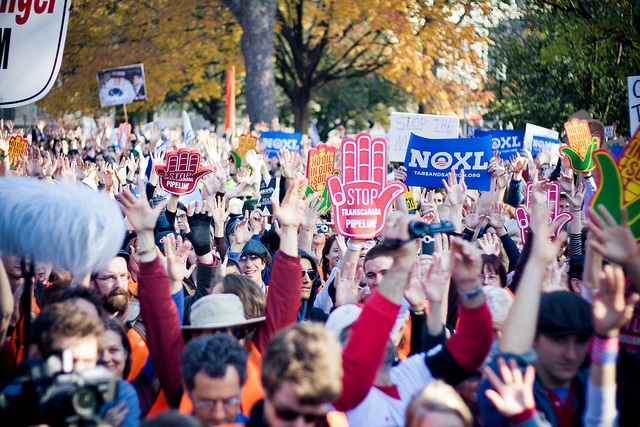Ten of the nation’s top climate scientists penned a letter to Secretary of State Hillary Clinton today questioning why the State Department isn’t considering the enormous climate change impacts of developing the Alberta tar sands in its review of the controversial Keystone XL export pipeline project.
“At the moment, your department is planning to consider the effects of the pipeline on ‘recreation,’ ‘visual resources,’ and ‘noise,’ among other factors,” the scientists wrote. “Those are important—but omitting climate change from the considerations is neither wise nor credible.”
The State Department is currently accepting comments on the scoping evaluation that will determine what environmental considerations will be included in the supplemental environmental impact statement (SEIS) required for the northern leg of the Keystone XL pipeline.The public comment period ends July 30.
The department’s previous draft EIS downplayed the climate risks of Keystone XL, arguing that the Alberta tar sands would be developed with or without it, so therefore the Obama administration has no accountability for the additional global warming pollution that will result from burning dirty tar sands oil.
In a press release announcing the letter, May Boeve, Executive Director of 350.org, said:
“Keystone became the biggest environmental cause of Obama’s first term–and the reason most of those who marched and went to jail gave for their concern was the climate impact of those vast tar sands. It would be ironic in the extreme if the State Dept. didn’t take the issue seriously in its review.”
Read the full text of the scientists’ letter to Secretary Clinton:
July 17, 2012
Dear Secretary Clinton,
We are writing to ask that the State Department conduct, as part of its evaluation of the Keystone XL pipeline proposal, a serious review of the effect of helping open Canada’s tar sands on the planet’s climate.
At the moment, your department is planning to consider the effects of the pipeline on “recreation,” “visual resources,” and “noise,” among other factors. Those are important—but omitting climate change from the considerations is neither wise nor credible. The vast volumes of carbon in the tar sands ensure that they will play an important role in whether or not climate change gets out of hand; understanding the role this largescale new pipeline will play in that process is clearly crucial.
We were pleased that President Obama saw fit to review this project more carefully; it would be a shame if that review did not manage to comprehensively cover the most important questions at issue.
Sincerely,
John Abraham
Associate Professor, School of Engineering
University of St. Thomas
Ken Caldeira
Senior Scientist
Department of Global Ecology
Carnegie Institution
James Hansen
Research Scientist
The International Research Institute for Climate and Society
The Earth Institute, Columbia University
Michael MacCracken
Chief Scientist for Climate Change Programs
Climate Institute
Michael E. Mann
Professor of Meteorology
Director, Earth System Science Center
The Pennsylvania State University
James McCarthy
Alexander Agassiz Professor of Biological Oceanography
Harvard University
Michael Oppenheimer
Albert G. Milbank Professor of Geosciences and International Affairs
Woodrow Wilson School and Department of Geosciences
Princeton University
Raymond T. Pierrehumbert
Louis Block Professor in the Geophysical Sciences
The University of Chicago
Richard Somerville
Distinguished Professor Emeritus and Research Professor
Scripps Institution of Oceanography
George M. Woodwell
Founder, Director Emeritus, and Senior Scientist
Woods Hole Research Center
Affiliations are listed for identification purposes only.
Subscribe to our newsletter
Stay up to date with DeSmog news and alerts






